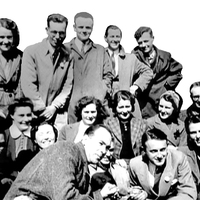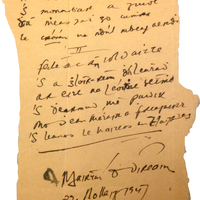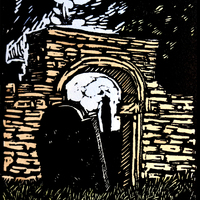Ár Ré Dhearóil / Our Wretched Era
Ár Ré Dhearóil
Is sa chnuasach Ár Ré Dhearóil (1962) atá an léiriú is léirsteanaí ar an stoiteachas a bhraith na fir thuaithe dhíphréamhaithe ‘sa chathair fhallsa’. Baineann an teideal macalla as mórdhán T. S. Eliot ‘The Wasteland’. Tá tionchar Ezra Pound agus W. B. Yeats le haithint ar an saothar freisin, chomh maith le tionchar phríomhfhilí Gaeilge an 17ú agus an 18ú haois.
Cuirtear Baile Átha Cliath inár láthair sa chnuasach seo mar áit aimrid, sheasc atá lán de bhaitsiléirí uaigneacha atá sáinnithe sa chathair agus nach bhfuil mar chomhluadar oíche acu ach a gcomhaid oifige.
“Beidh cuimhne orainn go fóill: Beidh carnán trodán Faoi ualach deannaigh Inár ndiaidh in oifigí stáit.”
A fhad is a thagann crapadh ar fhearúlacht na bhfear san áit lom uirbeach seo, tá dearcadh fíorchoimeádach ag an Direánach i leith na mban ardintinneach a shiúlann suas síos Sráid Grafton. Dar leis go bhfuil a gcuid cúraimí giniúna á séanadh acu le bheith ina sclábhaithe ag brandaí corparáideacha ar nós Dior agus Max Factor.
Tá frustrachas Uí Dhireáin leis an Saorstát soiléir freisin agus díomá air nár spreag réabhlóid na bhfilí i 1916 meas ceart ar luach sóisialta an ealaíontóra.
Our Wretched Era
Ó Direáin’s collection Ár Ré Dhearóil [Our Wretched Era] (1962) perhaps best captures the sense of alienation experienced by uprooted country men in the ‘cathair fhallsa’ (deceitful city). The title evokes T. S. Eliot’s The Wasteland (1922). Ezra Pound and W. B. Yeats are also important influences, as well as the leading Gaelic poets of the seventeenth and eighteenth centuries.
In this collection, Dublin is characterised as a barren, disabling environment which incarcerates its population of lonely bachelors whose only company at night are the office files they bring to bed with them.
“We will be remembered: There will be a heap of papers Under a load of dust Left after us in a state office.”
While the men find themselves emasculated by this arid urban landscape, Ó Direáin displays a deeply conservative attitude towards the spirited women who walk up and down Grafton Street. In his view, these women have repudiated their reproductive duties in favour of becoming slaves to the corporate global brands of Dior and Max Factor.
Ó Direáin’s political dismay with post-independence Ireland is also apparent as he laments how the poets’ revolution of 1916 did not lead to a due respect for the social value of the artist.
[Translation by Celia de Fréine]


